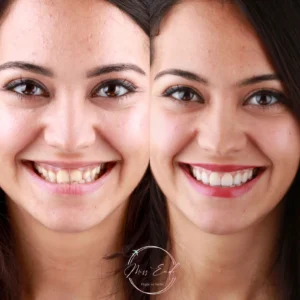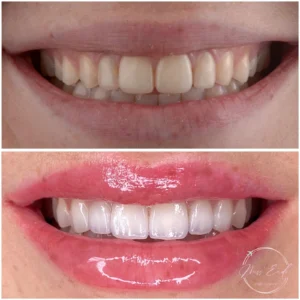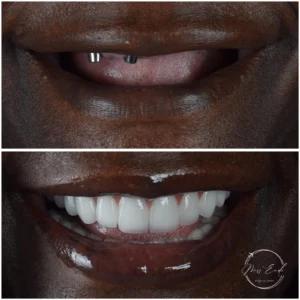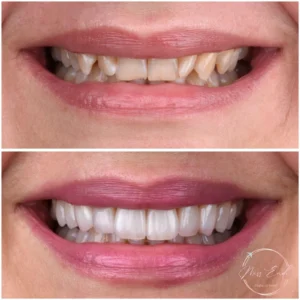
Full dentures are a complete set of prosthetic teeth designed to replace an entire arch of missing teeth, either in the upper jaw, lower jaw, or both. They are custom-made to fit the unique shape of an individual’s mouth, providing a functional and aesthetically pleasing solution for those who have lost all their natural teeth due to decay, injury, or other dental issues. Full dentures not only restore the ability to chew and speak effectively but also help maintain facial structure, preventing the sunken appearance that can occur with tooth loss. With advancements in dental technology, modern full dentures are more comfortable and natural-looking than ever, offering patients a renewed sense of confidence and improved quality of life.
Benefits of Full Dentures
💫 Full dentures restore the ability to chew and speak effectively, allowing individuals to enjoy a varied diet and communicate clearly without the limitations posed by missing teeth.
💫 Dentures enhance facial appearance by filling out the contours of the face, preventing the sunken look that often accompanies tooth loss. They can provide a natural smile that boosts self-esteem.
💫 Compared to dental implants or bridges, full dentures are generally more affordable, making them a viable option for individuals seeking to replace an entire arch of teeth without significant financial burden.
💫 The process of obtaining full dentures can be quicker than that of dental implants, as they do not require surgical procedures or extensive healing time, allowing patients to achieve results in a shorter period.
💫 Full dentures are custom-made to fit each individual’s mouth, ensuring comfort and stability. Modern techniques and materials allow for a better fit and more natural appearance.


💫 While dentures require regular cleaning and care, they do not need the same level of maintenance as dental implants, which may involve additional dental visits and procedures.
💫 Full dentures can help maintain oral health by preventing the remaining oral structures, such as gums and jawbone, from shifting due to the absence of teeth.
💫 Many individuals find it easier to adapt to full dentures compared to other tooth replacement options. With proper guidance from dental professionals, most patients can quickly become accustomed to their new dentures.
💫 Unlike dental implants, which require surgical placement, full dentures can be obtained without any surgical intervention, making them suitable for individuals who may be hesitant about surgery.
💫 Full dentures provide individuals with a complete set of teeth, helping them feel more confident in social situations, leading to improved overall well-being and quality of life.
Disadvantages of Full Dentures Compared to Dental Implants
1. Stability and Security: Full dentures can sometimes shift or become loose during eating or speaking, leading to discomfort or embarrassment. In contrast, dental implants are securely anchored in the jawbone, providing a stable and reliable solution.
2. Bone Loss: Full dentures do not prevent bone loss in the jaw, which can occur after tooth loss. Dental implants stimulate the jawbone, helping to maintain its density and structure over time.
3. Comfort: Many patients find dental implants to be more comfortable than full dentures. Implants integrate with the jawbone, while dentures may cause irritation or sore spots, particularly during the adjustment period.


4. Durability and Longevity: Full dentures typically have a shorter lifespan than dental implants, often requiring replacement or adjustments every few years. Implants are designed to be a permanent solution and can last a lifetime with proper care.
5. Functionality: Dental implants often provide better chewing efficiency than full dentures. Patients with implants can eat a wider variety of foods without the fear of dentures slipping, making them a more functional solution.
6. Aesthetic Appeal: Dental implants often offer a more natural appearance, as they look and function like real teeth. Full dentures may not achieve the same level of aesthetics, particularly if they do not fit well.
7. Maintenance: Full dentures require daily removal and cleaning, which can be cumbersome for some individuals. While dental implants also require care, they are maintained like natural teeth, eliminating the need for removal.
8. Adjustment Period: While many people can adapt to wearing full dentures, there can be a significant adjustment period during which patients may experience discomfort. Dental implants do not require such adjustments, as they function like natural teeth from the start.
9. Psychological Impact: Some patients may feel self-conscious about wearing full dentures, viewing them as a temporary or less desirable solution. Implants, being permanent, can enhance self-esteem and confidence regarding appearance and functionality.
10. Potential for Mouth Sores: Wearing full dentures can sometimes lead to mouth sores or irritation of the gums, particularly if the dentures do not fit properly. Dental implants, however, are placed in the bone and do not come into direct contact with the gums in the same way.


Who Is Not Suitable for Full Dentures?
While full dentures can provide a functional and aesthetic solution for many individuals missing all their natural teeth, they may not be suitable for everyone. Several factors can influence a person’s candidacy for full dentures, including:
1. Severe Gum Disease: Individuals with advanced gum disease may not be suitable for full dentures, as the condition can compromise the gums’ ability to support the prosthetic and lead to discomfort and further oral health issues.
2. Insufficient Jawbone Structure: Those with significant bone loss in the jaw may struggle to achieve a secure fit with full dentures. Adequate bone structure is necessary to support the dentures and maintain their stability.
3. Allergic Reactions: Some individuals may have allergies to the materials used in full dentures, such as acrylic or metal. This can lead to irritation or adverse reactions, making dentures unsuitable.
4. Poor Oral Hygiene: Individuals who have difficulty maintaining good oral hygiene may not be suitable for full dentures, as improper care can lead to gum disease, infections, and issues with the dentures themselves.
5. Cognitive or Physical Limitations: People who have cognitive impairments or physical limitations that make it difficult to care for removable dentures may not be ideal candidates. Full dentures require daily removal and cleaning, which can be challenging for some individuals.
6. Psychological Factors: Some patients may have anxiety or discomfort regarding removable dentures, impacting their willingness to adapt to and wear them effectively.
7. High Gag Reflex Sensitivity: Those with a strong gag reflex may find it challenging to wear full dentures, particularly if the prosthetic covers a significant portion of the mouth.


8. Desire for Permanent Solutions: Individuals looking for a more permanent solution for tooth replacement may not find full dentures suitable, as they are removable and may require replacements or adjustments over time. In such cases, options like stable prosthetics or implant-supported dentures may be more appropriate.
9. Active Oral Health Issues: Patients experiencing active oral health problems, such as infections or untreated cavities, may need to address these issues before considering full dentures.
10. Inability to Adapt: Some individuals may have difficulty adjusting to the feel and function of full dentures, impacting their overall satisfaction with the solution.
For those who may not be ideal candidates for full dentures, alternative solutions such as dental implants or implant-supported prosthetics might provide better outcomes based on individual needs, offering enhanced stability and comfort.

Premium Dental Care From Turkey’s Leading Specialists in Istanbul and Antalya

Miss Endo
Free Consultations and Aftercare are Available in Los Angeles Through Miss Endo





